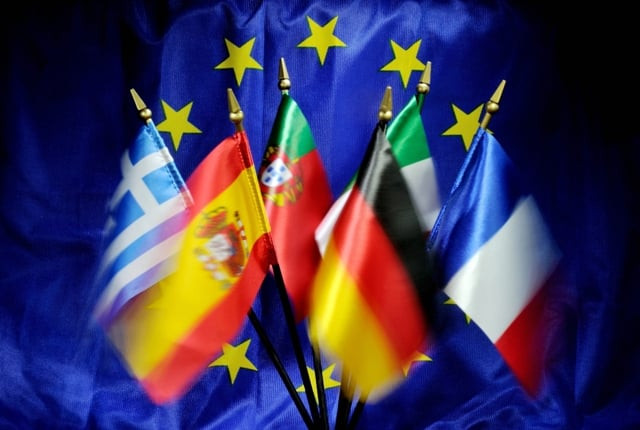EU’s members admit to flaws but hope to tackle them head-on
Seminar organised at KU sheds light on the multiple challenges being faced by the Union.

PHOTO: AFP/FILE
Klinner was one of the speakers at the event organised by Karachi University’s Area Study Centre for Europe on Tuesday. “EU is a project in the making and we will make sure that it is among the strongest players in the world.”
Discussing the Euro Zone Crisis and its impacts on Europe, he expressed hope that the Union would overcome its financial problems in the near future. “Despite all the financial problems, no member state wanted to leave the EU because they were aware of the benefits the come with being a part of it.”

Pierre Mayaudon, the deputy head of the European Union Delegation to Pakistan, was also of the view that facing new challenges have made the EU stronger every time. “The EU was born out of challenges but the economic crisis in the 1990s made us realise that we also need to look into security and other issues,” said Mayaudon. He congratulated Pakistan on the success of democracy on behalf of the Union. “The voting process on May 11 has brought Pakistan and the EU closer.”
Uniting against problems
One of the major challenges that the EU is facing is immigration, said Italian Consul General Roberto Franceschinis. “It is believed that migration brings problems for countries but the EU is determined to continue its immigration policies as it wants to keep its competitive edge over other regions,” he said. “The recent financial crunch has created new challenges not only for the EU but also for immigrants who have been marginalised in job markets.”
The French Consul General Christian Ramage shared his views on why the Union was formed. “Up till the 1940’s, peace was unthinkable in Europe but since the 1950’s, war has become unthinkable,” said Ramage. “After centuries of wars and especially the devastating effects of the first and second World Wars, France and Germany were highly opposed to wars and now the European countries share much better relationships.”
In her welcome address, the director of the Area Study Centre for Europe, Professor Dr Uzma Shujaat, commended the EU for transforming itself from an economic union to a political union over only half a century.
Published in The Express Tribune, May 29th, 2013.



















COMMENTS
Comments are moderated and generally will be posted if they are on-topic and not abusive.
For more information, please see our Comments FAQ